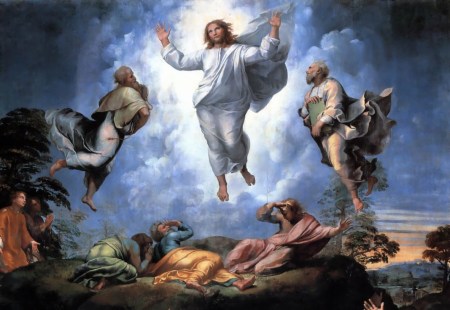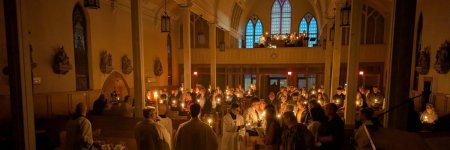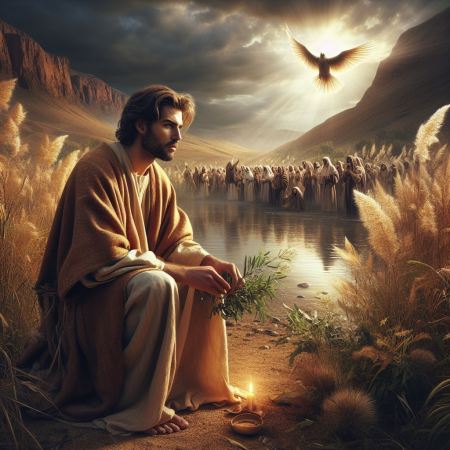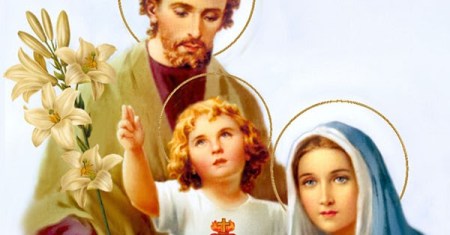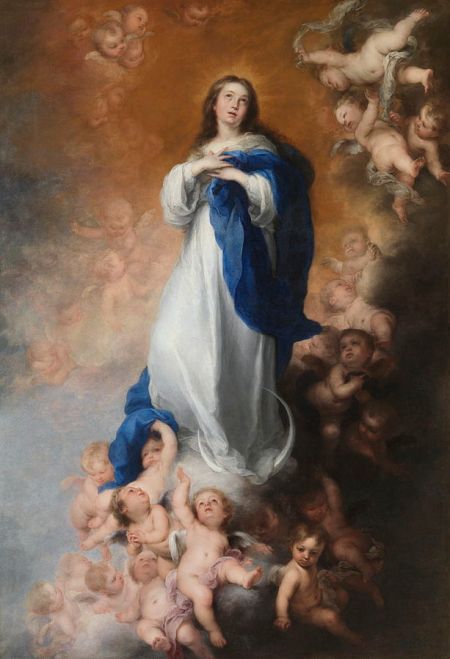2nd Sunday of Lent
By Fr. Victor Feltes
In an old church joke, one bewildered parishioner remarks, “I don’t know why people say our parish is unwelcoming. Every time I go to Sunday Mass, I say ‘Hello’ to everyone I know!” American Catholics in our day are not great at growing community. Strangers can attend a Catholic Mass, leave without meeting anyone, and go away feeling unwelcome. And sometimes Catholics stop attending Sunday Mass and no one reaches out to them about them being gone. Now it is true that you and I are to supposed come to Sunday Mass first and foremost for God. And if I neglect God’s command to worship at Sunday Mass the fault is first and foremost mine. But look at how much the Transfiguration in today Gospel was a communal, interpersonal experience.
Jesus leads Peter, James, and John up Mount Tabor. There he is transfigured before them, allowing them to glimpse his glory which was always there but veiled. Then they see the prophets Moses and Elijah conversing with Jesus. And then they hear God the Father speak: “This is my beloved Son, with whom I am well pleased; listen to him.” Hypothetically, instead of all three disciples, the Lord had the option of giving just one of them a vision. Peter would go on to have a solo vision upon a rooftop in the Book of Acts, and John receives solo visions for the Book of Revelation. But our Lord chooses Peter, James, and John to experience this vision together.
And what do they behold? Not a miracle manipulating the sun or stars. Not some abstraction words could not describe. They saw a person, their friend Jesus, in a new way. And Jesus was not revealed alone. The Old Covenant heroes, Moses and Elijah, speak with Jesus. Luke’s Gospel records that they spoke with Jesus about “his exodus that he was going to accomplish in Jerusalem.” Even before their redemption, these Old Testament saints appear glorious, and seem to know who Jesus is and aspects of his mission. The Communion of Saints in glory is not cut off from us on earth.
And then they all were visited by a further manifestation of God. A paradoxically bright cloud overshadows them (perhaps a manifestation of the Holy Spirit). And then from amidst that cloud they hear the voice of God the Father. The Transfiguration is a communal, interpersonal experience because Jesus wills his disciples to enter into deeper relationship with the Trinity, with himself, with his saints, and with each other together.
James and John were siblings. Peter was previously their partner and coworker in the fishing business. All three men were from Capernaum and knew each other well as friends. Those whom Jesus chose to be his twelve apostles were not always total strangers. Jesus utilized the existing relationships—of siblings, coworkers, neighbors, and friends—to draw people to himself and help them grow in Christian devotion together. Jesus would do the same with us.
Our Catholic Faith is like a gold coin entrusted to us by our Lord. Will we continue to bury it in a napkin, afraid of making any outgoing effort to evangelize? Or will we invest this coin into others for a God-pleasing return? Imagine the joy of bringing another soul to Jesus Christ and his Church. Invite other people to our worship. They might be interested in attending Holy Mass or Adoration, but you won’t know unless you ask. When you see new folks at Mass, say “hello” to them in our vestibule. And when you haven’t seen someone for a while at Mass, let them know they’re missed. Invite people to our groups and events; they’re fun organizations and accomplish good work; Keep an eye on the bulletin for opportunities or ask someone how to get involved. Join and invite friends to share in these fruitful fellowships.
Our mission, yours and mine, is the Great Commission. And that mission is relational. Jesus says, “Go and make disciples of all nations…” He is God the Father’s beloved Son, with whom the Father is well pleased. Please listen to him, so that more people you know may experience the priceless blessings you enjoy in Jesus Christ and his Church.
